- Home
- Mordecai Richler
Dispatches From the Sporting Life Page 6
Dispatches From the Sporting Life Read online
Page 6
“Sure.”
“I just wanted to tell you,” he said, “that I’m glad to be in your city, it’s a wonderful opportunity, and I think body building is marvellous.”
“Isn’t that sensational?” Dr. Tilney said.
Chuck Sipes, the former Mr. America, came out and bent some enormous nails. He asked for a hot-water bottle and blew it up and exploded it just like a child’s balloon.
“He’s demonstrating wonderful lung power,” Dr. Tilney said.
Chuck said he’d like to tear a telephone book for us.
“You’ll notice,” the doctor said, “that he’s starting on the real tough end, the bound end of the book.”
Chuck pulled, he grimaced, he grunted, he pulled again.
“A lot of you folks have heard body builders are musclebound. Well, you just watch Chuck here demonstrate …”
Chuck couldn’t tear the book. He apologized, explaining that his hands were still greasy from having rubbed so much olive oil on his chest before posing for us.
“See you on Sunday at the Monument National,” Dr. Tilney said.
The crowd began to disperse. I went home to study Weider’s magazines and correspondence courses and to read up on Dr. Tilney, in anticipation of the grand contest on Sunday.
The pinups and articles in Muscle Builder and Mr. America appear between advertisements for Weider equipment. In one advertisement in Muscle Builder, Weider offers his readers $50 worth of personality courses FREE—with each order for $21.98 worth of equipment. Otherwise, his booklets sold for $1 each. They included How to Make Women Like You, How to Develop Leadership Qualities, and Sex Education for the Body Builder. “WHAT YOU DARE TO DREAM,” one booklet advised, “DARE TO DO.”
All the personality-course booklets were signed “Joe Weider, Trainer of Champions,” but Dr. Tilney assured me that he was the actual author. The doctor, who had been in the health business for fifty years, also claimed that he had written the original Charles Atlas courses in the twenties and, to his regret, sold them outright for $1,000.
Tilney was a doctor of philosophy, divinity, natural law, naturopathy, chiropractic, and food science. I am indebted to Armin Mitto-Sampson of Trinidad for this information. Mitto-Sampson, author of Meet…Dr. Frederick Tilney, writes, “He stands like a Colossus, a God-propelled Titan, floodlighting the cosmos with his inspirational thunderbolts. He has zoomed up the voltage of more downtrodden souls than most all the Teachers, Adepts, Masters and Leaders of Men put together…. Most of Dr. Tilney’s articles are stunners—torrid capsules…. His word-arrows are the language of TRUTH, not the piffle of intellectual witch-doctors…. At his lectures truth-starved souls gulp his gems, eager to utilize the Jewels of his Thoughts.”
The next time I saw the doctor it was backstage at the Monument National Theatre on the day of the Mr. Universe and Mr. America contests, and all around me body builders were busy rubbing olive oil on each other’s back and chest, posing for photographers, and trying out difficult postures before a full-length mirror. Ben Weider flitted anxiously from group to group, like a bad-tempered schoolmarm on scholarship day. I spotted my friend Mr. Scotland Sr. standing alone. He was, like so many of the body builders in the contest, an unusually short man. “If you ask me,” he said, “it’s going to be Mr. Guadeloupe and Mr. France. They can’t be beat.”
Joe Weider, who had flown in from Union City for the contest, wore a dark suit, a conservative tie, and a pleated dress shirt. A romantic drawing of him appeared in almost all Weider advertisements and bottle labels. The drawing showed Joe with enormous arms folded over a massive bare chest, his expression manly, commanding, but of course it could give no indication that in real life he also suffered from a nervous twitch.
“You all get into a circle now,” Joe ordered the bashful contestants. “Did you hear what I said?” And he began to strut around them like a ringmaster. Meanwhile, Ben, followed everywhere by a sad, nearsighted photographer, grabbed Mr. Guadeloupe. “Take my picture with him.” Briefly, Ben smiled. “Got it?”
The photographer nodded.
“Where in the hell’s Mr. France?”
I took a seat in the orchestra pit with the judges and noted that the contest had attracted a full house. Ben Weider welcomed us on behalf of the IFBB. The master of ceremonies came out and told us, “I will announce each contestant as Mr. So-and-so from here-here in English and French. Then I’ll tell you his weight, height, and measurements of chest and biceps. That’s biceps,” he said, grinning, “not bisex. I will also tell you where each contestant has flown in from for the contest.”
The boys began to appear onstage. The former Mr. Eastern Canada Jr., Mr. Calcutta, the Most Muscular Man from the Middle Atlantic, Mr. Hercules Jr., Mr. Montreal, Mr. Northern Quebec, and Mr. Muscle Beach. One by one they stepped under the spotlight, assumed a series of virile poses, and showed some spectacular muscle control. The last activity includes throwing the shoulder blades astonishingly far apart, jerking breast muscles, raising shoulder humps, and revolving yet other muscles.
During the intermission, between the Mr. America and Mr. Universe contests, the activity backstage was frenetic, what with cameramen competing to get shots of the likely winners. Ben Weider, here, there, and everywhere, attempted to gather his body builders into a corner. “Now listen to this! Will you come here and listen, please!”
Slowly the contestants gathered around.
“There will be no more gum chewing or muscle control. And I’m not kidding, guys. Anybody who does chew gum or do muscle-control stunts onstage will lose points.”
I was, I must say, taken aback by Weider’s behaviour. Only the other day I had read, in How to Develop Leadership Qualities, “Avoid shouting… BE FIRM—BUT DON’T BULLY. The most commanding people I’ve met were the gentlest and the kindest. Only the weak individual becomes a bully.” But this, I felt, was not the right time for reproaches.
The second half of the program, the Mr. Universe contest, moved along more quickly than the first, and after the lads had done their bit Ben Weider summoned them into a corner once more. “Okay, we’re soon going to announce the results. Now listen, you guys, will you listen, please. EVERYBODY’S GOING TO GET A MEDAL. But you have to be ready to go on as soon as your name is called. Understand? Be ready when your name is called. And just don’t come crying to me afterwards and say you didn’t get your medal. Because you won’t get your medal afterwards.”
Before the results were announced, Weider, once more composed and soft-spoken, came onstage to present an award to Dr. Tilney for his tremendous contribution to the cause of body building. “The doc,” he said, “is a real okay fella.”
Then, one by one, the contestants’ names were called, and, just as Weider had promised, there were medals for everybody. Mr. Guadeloupe and Mr. France both won bigger trophies than the rest, but the grand prize of all, Mr. Universe, went to Chuck Sipes. He burst into tears.
Then it was off to the City Hall in the rain for the official reception. Dr. Tilney and the other judges had already arrived by the time I got there. Heaps of sandwiches and glasses of fruit juice were laid out on a long table. Finally, the boys began to turn up. And after a short delay, Ben Weider rushed into the hall, carrying diplomas in both arms. Tony Lanza, one of the judges, went to summon the mayor.
Sarto Fournier, then mayor of Montreal, told us how much he admired body builders. “I have been told,” he said, “that you boys have come from twenty different countries.”
Weider summoned his photographer to take pictures of himself with the mayor. Shuffling through diplomas, he began to call the boys forward. “And this,” Weider said to the mayor, “is the young man who won the Most Muscular Man in America Award. He’s a fine French-Canadian boy, Your Worship.”
The mayor grasped the boy’s hand and smiled. Photographers drew nearer. Weider, also smiling, stepped between the mayor and the boy, thrusting his wife into the picture as well.
“And this, sir, is Bill Cook, MR. IRELAND!”
<
br /> Cook wore a green jacket.
“I can see,” the mayor said, with a twinkle in his eye, “that you are Irish.”
Weider shook with laughter.
Then, as more and more boys came forward to collect diplomas, the mayor glanced anxiously at his watch. Weider began to speed things up. “The mayor,” Weider said, “has taken off valuable time from his work to greet us here. Well, I think everybody will agree he’s a jolly good fellow.”
As Ben Weider and his wife, brother Joe, and Chuck Sipes gathered around, the mayor got out his Golden Book. Everybody smiled for the sad, nearsighted photographer. “No, no, NO,” Weider protested. “I want my wife to sign the Golden Book too.”
4
With the Trail Smoke Eaters in Stockholm
In 1963 the world ice hockey championships were not only held in Stockholm but, for the third time, the Swedes were the incumbent champions and the team to beat. Other threatening contenders were the Czechs and the Russians, and the team everyone had come to see humiliated was our own peppery but far from incomparable Trail Smoke Eaters.
“No nations can form ties of friendship without there being personal contact between the peoples. In these respects sports builds on principles of long standing,” Helge Berglund, president of the Swedish Hockey Association, wrote warmly in the world hockey tournament’s 1963 program. Berglund’s bubbly letter of greeting continued, “I do hope the ice hockey players will feel at home here and that you will take advantage of your leisure to study Swedish culture and Swedish life. Welcome to our country.”
Yes, indeed; but on the day I arrived in Stockholm a poster advertising a sports magazine on kiosks everywhere announced “THE CANADIANS WANT TO SEE BLOOD.” Only a few days later a headline in the Toronto Daily Star read “UGLY ROW IN SWEDEN OVER OUR HOCKEY TEAM.”
I checked into the Hotel Continental, a well-lit teak-ridden place where well on a hundred other reporters, radio and television men, referees, a hockey priest, and a contingent of twenty-seven Russians were staying and immediately sought out Jim Proudfoot of the Toronto Daily Star. Proudfoot had just returned from a cocktail party at the Canadian embassy. “What did the players have to say?” I asked.
“The players weren’t invited.”
The next morning things began to sizzle. On Saturday night, according to the most colourful Swedish newspapers, a substitute player with the Canadian team, Russ Kowalchuk, tried to smuggle a girl into his room and was knocked senseless by an outraged hall porter. Kowalchuk, enthusiastically described as a “star” in one Swedish newspaper and “a philandering hoodlum” in another, was not flattered: he denied that there had been a girl involved in the incident and claimed he had been flattened by a sneak punch.
Two things worried me about this essentially commonplace story. While it seemed credible that a hotel porter might be shocked if a hockey player tried to sneak a stuffed rabbit into the elevator, it did seem absurd that he would be shaken to his roots if a man, invited by Helge Berglund to study Swedish life, tried to take a girl to his room. And if the Canadians were such a rough-and-ready lot, if they were determined to crush Swedish bones in Friday night’s game, wasn’t it deflating that one of their defencemen could be knocked out by a mere porter? More important, mightn’t it even hurt the gate?
The Trail Smoke Eaters, as well as the Czech, Russian, and American players, were staying at the Malmen—not, to put it mildly, the most elegant of hotels, a feeling, I might add, obviously shared by the amateur hockey officials associated with the Smoke Eaters, which group sagaciously put up at the much more commodious Grand Hotel.
When I finally got to the Malmen at noon on Sunday, I found the sidewalk outside all but impassable. Kids clutching autograph books, older boys in black leather jackets, and fetching girls who didn’t look as if they’d need much encouragement to come in out of the cold, jostled each other by the entrance. An American player emerged from the hotel and was quickly engulfed by a group of autograph-hungry kids. “Shove off,” he said, leading with his elbows; and if the kids (who, incidentally, learn to speak three languages at school) didn’t grasp the colloquialism immediately, then the player’s message, I must say, was implicit in his tone. The kids scattered. The American player, however, stopped a little farther down the street for three girls and signed his name for them. I knew he could sign too, for, unlike the amateurs of other nations, he was neither a reinstated pro, army officer, or sports equipment manufacturer but a bona fide student. Possibly, he could sign very well.
In the lobby of the Malmen, Bobby Kromm, the truculent coach of the Smoke Eaters, was shouting at a Swedish journalist. Other players, reporters, camp followers, cops, agents provocateurs, and strong-armed hotel staff milled about, seemingly bored. Outside, kids with their noses flattened against the windows tried to attract the attention of the players who slouched in leather chairs. Suddenly the Russian team, off to a game, emerged from the elevators, already in playing uniforms and carrying sticks. A Canadian journalist whispered to me, “Don’t they look sinister?” As a matter of fact, if you overlooked the absence of facial stitches, they closely resembled the many Canadians of Ukrainian origin who play in the National Hockey League.
Bobby Kromm and his assistant manager, Don Freer, were also off to the game, but they agreed to meet me at eight o’clock.
When I returned to the Malmen that evening, I saw a car parked by the entrance, three girls waiting in the backseat. Kids, also hoping to attract the players’ attention, were banging coins against the lobby windows. The players ignored them, sucking on matchsticks. Kromm, Freer, and I went into the dining room, and while I ordered a cognac I was gratified to see that the reputedly terrifying Smoke Eaters, those behemoths who struck fear into the hearts of both Swedish mothers and Russian defencemen, stuck to coffee and pie.
Kromm, assuming our elderly waiter could understand English, barked his order at him and was somewhat put out—in fact, he complained in a voice trained to carry out to centre ice—when the waiter got his order wrong. The waiter began to mutter. “You see,” Kromm said, “they just don’t like Canadians here.”
I nodded sympathetically.
“Why do they serve us pork chops, cold pork chops, for breakfast?”
“If you don’t like it here, why don’t you check out and move right into another hotel?”
This wasn’t possible, Kromm explained. Their stay at the Malmen was prepaid. It had been arranged by John Ahearne, European president of the International Ice Hockey Federation, who, as it turned out, also ran a travel agency. “If they’d treat us good here,” Kromm said, “we’d treat them good.”
Freer explained that the Smoke Eaters had nothing against the Swedes, but they felt the press had used them badly.
“They called me a slum,” Kromm said. “Am I a slum?”
“No. But what,” I asked, “is your big complaint here?”
Bobby Kromm pondered briefly. “We’ve got nothing to do at night. Why couldn’t they give us a Ping-Pong table?”
Were these men the terror of Stockholm? On the contrary. It seemed to me they would have delighted the heart of any YMCA athletic director. Freer told me proudly that nine of the twenty-one players on the team had been born and raised in Trail and that ten of them worked for the CM and S.
“What does that stand for?” I asked.
“I dunno,” he said.
It stands for Consolidated Mining and Smelting, and Bobby Kromm is employed as a glassblower by the company. All of them would be compensated for lost pay.
Kromm said, “We can’t step out of the hotel without feeling like monkeys in a cage. People point you out on the streets and laugh.”
“It might help if you didn’t wear those blazing red coats everywhere.”
“We haven’t any other coats.”
I asked Kromm why European players didn’t go in for body checking.
“They condone it,” he said, “that’s why.”
I must have looked baffled.
> “They condone it. Don’t you understand?”
I did, once I remembered that when Kromm had been asked by another reporter for his version of the girl-in-the-lobby incident, he had said, “Okay, I’ll give you my impersonation of it.”
Kromm and Freer were clear about one thing. “We’d never come back here again.”
Jackie McLeod, the only player on the team with National Hockey League experience, didn’t want to come back again either. I asked him if he had, as reported, been wakened by hostile telephone calls. He had been wakened, he said, but the calls weren’t hostile. “Just guys in nightclubs wanting us to come out and have a drink with them.”
While Canadian and Swedish journalists were outraged by Kowalchuk’s misadventures, the men representing international news agencies found the tournament dull and Stockholm a subzero and most expensive bore. Late every night the weary reporters, many of whom had sat through three hockey games a day in a cold arena, gathered in the makeshift press club at the Hotel Continental. Genuine melancholy usually set in at 2:00 a.m.
“If only we could get one of the Russian players to defect.”
“You crazy? To work for a lousy smelting factory in Trail? Those guys have it really good, you know.”
The lowest paid of all the amateurs were the Americans, who were given $20 spending money for the entire European tour; and the best off, individually, was undoubtedly the Swedish star, Tumba Johansson. Tumba, a $10-a-game amateur, had turned down a Boston Bruins contract offer but not, I feel, because he was intent on keeping his status pure. A national hero, Tumba earns a reputed $40,000 a year through a hockey equipment manufacturer. First night on the ice not many Swedish players wore helmets. “Don’t worry,” a local reporter said, “they’ll be wearing their helmets for Tumba on Wednesday. Wednesday they’re on TV.”
It was most exhilarating to be a Canadian in Stockholm. Everywhere else I’ve been in Europe I’ve generally had to explain where and what Canada was, that I was neither quite an American nor really a colonial. But in Sweden there was no need to fumble or apologize. Canadians are known, widely known, and widely disliked. It gave me a charge, this—a real charge—as if I actually came from a country important enough to be feared.

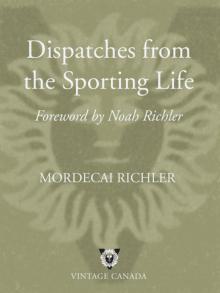 Dispatches From the Sporting Life
Dispatches From the Sporting Life The Acrobats
The Acrobats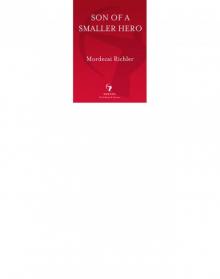 Son of a Smaller Hero
Son of a Smaller Hero Jacob Two-Two-'S First Spy Case
Jacob Two-Two-'S First Spy Case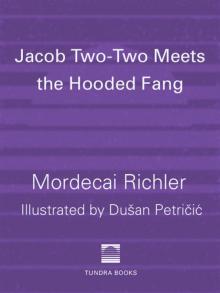 Jacob Two-Two Meets the Hooded Fang
Jacob Two-Two Meets the Hooded Fang Jacob Two-Two and the Dinosaur
Jacob Two-Two and the Dinosaur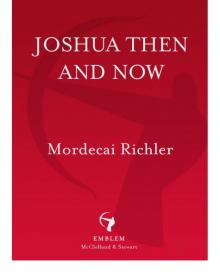 Joshua Then and Now
Joshua Then and Now Solomon Gursky Was Here
Solomon Gursky Was Here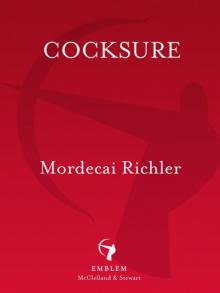 Cocksure
Cocksure The Street
The Street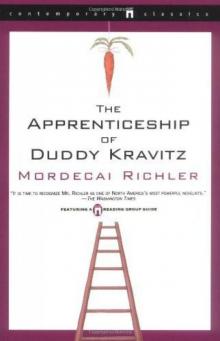 The Apprenticeship of Duddy Kravitz
The Apprenticeship of Duddy Kravitz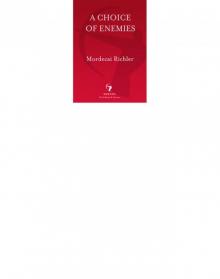 A Choice of Enemies
A Choice of Enemies Barney's Version (Movie Tie-In Edition)
Barney's Version (Movie Tie-In Edition)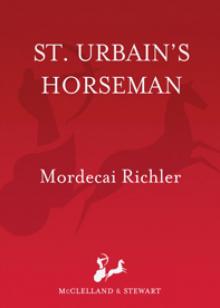 St. Urbain's Horseman
St. Urbain's Horseman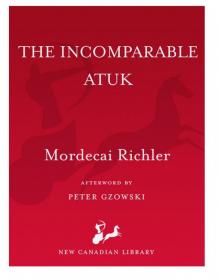 The Incomparable Atuk
The Incomparable Atuk Barney's Version
Barney's Version